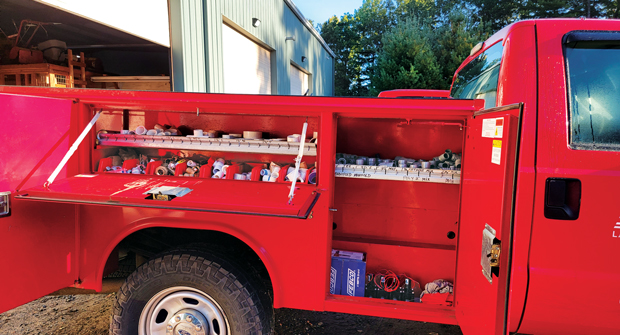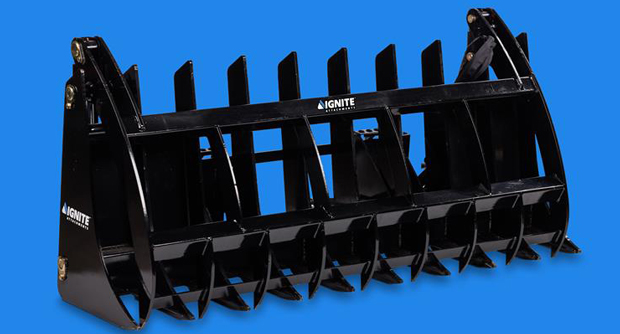
Most irrigation professionals will attest that getting crews to maintain vehicle organization is an ongoing journey and not necessarily a destination. Orderliness ensures efficiency, reduces material waste and contributes to greater profitability.
Mark Twiss is bullish when it comes to adequately organizing his irrigation trucks.
“Maintaining an organized (irrigation) truck increases our productivity out in the field,” says the certified irrigation contractor and irrigation services manager at DW Burr Landscape and Design in Simsbury, Conn. “If we fail to maintain that level of order and organization, then we lose time, which results in us losing money.”
DW Burr maintains a service portfolio of 40 percent landscape maintenance, 30 percent snow and ice management, 20 percent hardscaping, and 10 percent irrigation installation and maintenance.
A place for everything

Twiss is a big fan of storage, so he uses vehicles specially equipped with onboard systems that feature a variety of compartments to hold tools and parts. DW Burr uses racks to stow hand tools and pipes, and the company also uses multi-pocketed tool bags and custom 5-gallon bucket inserts for tool and part storage. Twiss’ mantra: Everything has its place.
“It’s important that everyone follows protocol and that all of the tools we use out in the field are always returned to the same place on the truck,” he says. “And the same goes for parts and where they’re stored. We don’t have the luxury of wasting time during the day hunting down specific parts or a specific tool, or worse — we have to leave a job site to make a trip to the (irrigation) supply house. That’s why everything is put away in its proper place (on the truck).”
Invest to organize
J.C. Wheaton, president of Centerville Landscape and Irrigation, says a well-devised storage system is a wise investment, whether a contractor is utilizing a basic pick-up truck, a truck modified with side and rail boxes or a commercial van outfitted with elaborate shelf and bin systems.
“You’re going to need to spend a little money at the onset, but it’s well worth the investment,” Wheaton says. “You need a good identifiable (storage) system that will allow you to organize, store and find all of the small parts, screws, nozzles, wiring — all of those things you need handy at the job site. If you’re throwing everything into a big box in the back of the truck, then you’re going to eat up a lot of time looking for what you need.”
Wheaton’s Dayton, Ohio-based company runs seven trucks, two for irrigation installation and five for service work. Overall, the company service portfolio is a 50/50 split between irrigation and landscape management, and its client makeup is 60 percent commercial and 40 percent residential.
A crew to a vehicle
From day one, Twiss and Wheaton train crewmembers on the tenets and virtues of intelligent storage. Wheaton believes keeping crews with the same vehicles contributes to maintaining order. However, he warns against dictating how crews should set up their vehicles.
“Everyone has their own way of organizing things, how they prefer to orient and access their tools versus their parts, and how and where they like to store things like glues, cleaners and Teflon tape,” he says. “Just be sure you provide adequate storage (capacity) and let them manage the rest.”
Solid storage and organization practices affect parts inventory, as well. Both Twiss and Wheaton believe over-purchasing is a significant financial waste and breeds vehicle disorganization.
“One of the biggest mistakes is double buying,” Wheaton says. “Make sure everything is organized (on the vehicle) properly so crews know what they have, and you’re not buying three boxes of the same expensive parts or materials.”
Twiss and his team utilize FieldCentral, an irrigation software platform that helps them manage job assignments, tracks parts inventory and alerts them when items run low.
“(The software) is a vital component to keeping everything organized and current,” he adds. “And we waste less time looking for or having to buy something during the day that we didn’t realize we needed.”
Zawacki is a Cleveland-based writer covering the landscape industry for nearly two decades.

